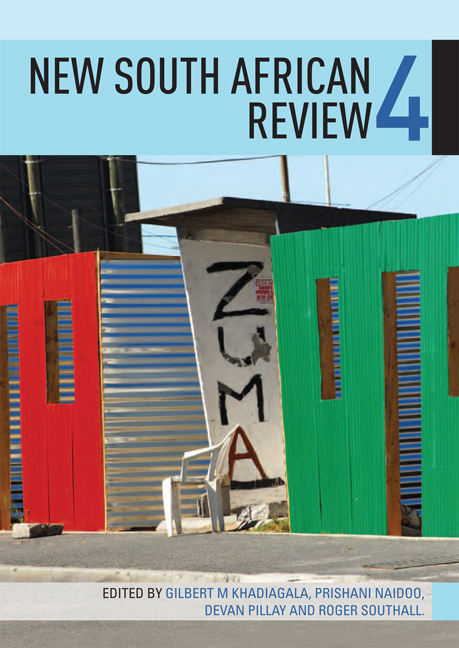Book contents
- Frontmatter
- Contents
- Preface
- Introduction: South Africa's fragile democracy: Twenty years on
- PART ONE ECOLOGY, ECONOMY AND LABOUR
- PART TWO POWER, POLITICS AND PARTICIPATION
- Introduction
- Chapter 6 Platinum, poverty and princes in post-apartheid South Africa: New laws, old repertoires
- Chapter 7 amaDiba moment: How civil courage confronted state and corporate collusion
- Chapter 8 Secrecy and power in South Africa
- Chapter 9 The contemporary relevance of Black Consciousness in South Africa
- Chapter 10 Death and the modern black lesbian
- PART THREE PUBLIC POLICY AND SOCIAL PRACTICE
- PART FOUR SOUTH AFRICA AT LARGE
- Contributors
- Index
Chapter 10 - Death and the modern black lesbian
from PART TWO - POWER, POLITICS AND PARTICIPATION
Published online by Cambridge University Press: 21 April 2018
- Frontmatter
- Contents
- Preface
- Introduction: South Africa's fragile democracy: Twenty years on
- PART ONE ECOLOGY, ECONOMY AND LABOUR
- PART TWO POWER, POLITICS AND PARTICIPATION
- Introduction
- Chapter 6 Platinum, poverty and princes in post-apartheid South Africa: New laws, old repertoires
- Chapter 7 amaDiba moment: How civil courage confronted state and corporate collusion
- Chapter 8 Secrecy and power in South Africa
- Chapter 9 The contemporary relevance of Black Consciousness in South Africa
- Chapter 10 Death and the modern black lesbian
- PART THREE PUBLIC POLICY AND SOCIAL PRACTICE
- PART FOUR SOUTH AFRICA AT LARGE
- Contributors
- Index
Summary
‘Those who are directly identified with same-sex desire most often end up dead; if they manage to survive it is on such compromised terms that it makes death seem attractive.’
(Heather Love 2007:1)‘Another lesbian rape and murder,’ read a beaded newspaper headline in the latest exhibition on black lesbian lives by photographer Zanele Muholi (2012). Its reference was to the Eastern Cape born Noxolo Nogwaza, a 24-year-old mother of two, who had been brutally murdered in KwaThema outside Johannesburg in April 2011. At her funeral, an old male family member cried out: ‘We are disappearing because of crime and violence. We are disappearing because of jealousy. We will be non-existent because of battering.’ Noxolo's name joined the list of many young black lesbian, gay and transgender people murdered because of their sexual or gender nonconformity. Mourning such deaths had become ordinary as people's lives were cut short because of who they were.
In their recent publication, What's in a Name? Language, Identity and the Politics of Resistance, the One in Nine Campaign states: ‘When people in other parts of the world hear about lesbians in South Africa through the media, almost the only thing they are likely to learn is that butch, black, soccer-playing lesbians in townships are raped, and sometimes killed, by black men who wish to “correct” them …’ (2013:1). A recent international media report read: ‘Being a lesbian in South Africa can be a death sentence’ (Turley 2012). This is the popular representation of black lesbians in South Africa today, in both public discourse and academic texts. In light of twenty years of democracy and the inclusion of sexual minorities in the Constitution, it is of concern that such representation still prevails.
Black lesbian life in South Africa (and on the African continent) has become synonymous with rape and even death. Death, as opposed to life, has received much attention in relation to the black lesbian body. It is an unwanted site, a body constantly rejected, excluded, marked as ‘ungodly, unAfrican’ or even not ‘properly’ woman, and it is no surprise that black lesbians’ relationship to death has been so close. Heather Love (2007:4) argues that because of the rejection, social exclusion and historical ‘impossibility’ of same-sex desire, people in same sex relationships often feel attracted to the idea of death.
- Type
- Chapter
- Information
- New South African Review , pp. 182 - 196Publisher: Wits University PressPrint publication year: 2014



